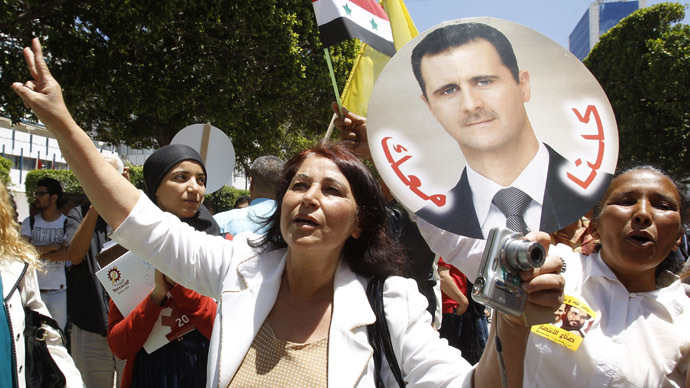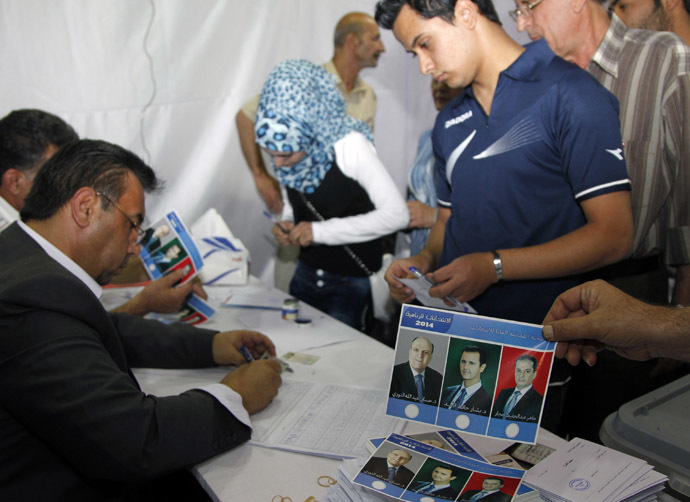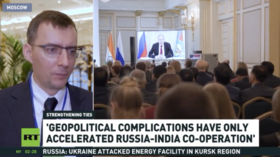Western hypocrisy rejected: Syria's people make their choice

The results of Syria’s first presidential election in nearly half a century have finally come in and the Syrian people have overwhelmingly given Assad a clear mandate to continue going forward with his anti-terrorist and civil reconciliation policies.
Bashar Assad was elected by 88.7 percent of voters, with 10.2 million Syrians turning out to support the incumbent president. Despite the tsunami of support that Assad has received from his electorate, the West and its allies still refuse to recognize their democratic will and have actually gone to certain lengths to suppress it. This is because the election results do not conform to the Western geopolitical agenda, much as how Hamas’ 2006 landslide was also not recognized. By refusing to listen to the voices of the Syrian people, the US is enacting sub-human standards against those whom it cannot directly influence. In defiance of Western intimidation, the vote demonstrates that the Syrian people have risen up in resistance against the US-dominated world and have a multipolar vision of the future.
Unlike the controversy over Syria’s election, there were no Western qualms in recognizing the one in Ukraine, let alone in 1967 South Vietnam, which at the time was engaged in a civil war and direct US military intervention. Americans have never voted down a sitting president during a time of “war”, yet the US government wants to castigate Syrians for doing the same. It is contradictory that the US, which hasn’t seen a real war near or within its borders since the 1848 US-Mexican War, has this democratic prerogative, but the same reasoning is rejected for Syrians, who are arguably emerging from a more painful and vicious conflict than anything the West has been through since World War II.
Even in the heyday of 1960s racism in the Jim Crow South, at least some blacks were able to have their voices heard, but this is sadly not the case for Syrians in 21st-century America who wanted to participate in this historic election. The US, along with its Canadian, German, French, Belgian, and Gulf allies, barred Syrians in the country from voting in the elections. Lebanon also threatened to rescind the refugee status of Syrians who go to the border to vote there. Considering that 95 percent of registered expat voters in 43 other countries voted in the election, the aforementioned countries’ behavior can only be seen as voter suppression. America’s popular “Get out the vote” campaign or MTV’s “Rock the vote” initiatives are noticeably absent. It is textbook hypocrisy when the world’s most vehement exporter of “democracy” uses its political and cultural tools to support voting in the pro-Western world but then uses those same tools to suppress eager participants in a non-Western vote. As a cultural case in point, Facebook recently removed all advertisements for Assad’s Sawa (“Together”) reelection campaign, further stymying free speech and censoring the web.

The US has repeatedly said that holding an election in the midst of a supposed civil war is a “disgrace” and won’t berecognized, but it is overlooking the fact that Syria is actually facing an external war supported from abroad. The country in the throes of an actual full-scale civil war is Ukraine, not Syria, and following this logic, it is actually the Ukrainian election that is undemocratic. Nonetheless, the US was not discriminatory at all when it came to Ukrainians in the country voting in their “elections.” In fact, “arecord1,600 (Ukrainians) came to Ukraine’s Chicago consulate May 25 to vote”, clearly showing that the US only supports elections when it has a guiding influence over the results.
The West and its allies’ in-your-face hypocrisy over the Ukrainian and Syrian elections, not even two weeks apart, shows its mangled and subjective understanding of “democracy.” Although the global attention span is unfortunately short, it is not short enough for these events’ meanings and symbolism to be lost on the public. When the Secretary General of NATO says that he is “sure no [NATO] ally will recognize the outcome of these so-called elections”, he and his military organization are missing an important point. NATO is under the delusion that it alone can unilaterally decide what is democratic or not, but the unipolar world is rapidly fading and new norm and value systems, different from the Western understanding, are emerging.
Syria does not need the partisan West to recognize its elections – it has the rest (Russia, China, Iran, etc.) to do so instead, and these partners are more important and friendly to Syria than any false friends in the West or the Gulf. The Syrian crisis has given these other countries the opportunity to come together and develop a common policy for approaching the events in Syria.
In this manner, Syria has come forward in the global resistance against Western unilateralism and domination and has demonstrated why resistance is not futile. If Yanukovich would have been as tough as Assad and did not flee the country like Tunisia’s Ben Ali, then the Ukrainian events may have looked altogether different. After making it clear that Ukraine was facing aggression financed and supported from outside, Ukrainians may have rallied around their president in 2015 like Syrians did around Assad in 2014.
The elections in Syria demonstrate that sovereignty can survive even in the direst conditions. Although the country has been externally pressured, internationally sanctioned, and placed into a situation of constant violence for over the past three years, its people were still able to decide their own future. Syrians have thus shown the world that democracy can still exist – even if the West does not recognize it as such.
Andrew Korybko for RT
The statements, views and opinions expressed in this column are solely those of the author and do not necessarily represent those of RT.
The statements, views and opinions expressed in this column are solely those of the author and do not necessarily represent those of RT.













